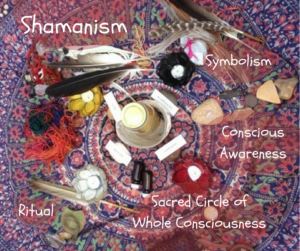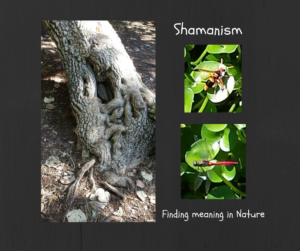Shamanism can mean many things to many people. Often the meaning is coloured by past experiences or supposition. In the case of shamanism, one might be forgiven for having a picture of a mad looking ‘native’ medicine man shaking rattles and chanting – from an old western movie.
You may have the impression that Shamanism is a religion ready to push its beliefs on you. Or you may sense that Shamanic practices are spiritual or magical, and way out of your comfort zone.
Shamanism is not a religion. However, it is a practice that balances your life with spiritual awareness – often ignored in the busy-ness of life. In our contemporary society, it is easy to become unbalanced; not confident and self-assured. Spirituality in Shamanic terms refers to your innate energy and the energy of everything – if you have a religious deity you can relate to spirit according to your beliefs. Shamanic practices bring great depth, colour and healing into your life, enriching it with tools that help you to live as you desire.
Frequently Asked Questions.
Q. What is Shamanism?
A. The word Shaman is a Siberian word for ‘spiritual healer’ and is the world’s oldest healing tradition. Shamanism has been practiced for tens of thousands of years across the world. In ancient times and in the few traditional indigenous communities that still exist today, the shamans have a key role in their communities. The role of the Shaman is very varied and traditionally more than one person may share the role with each specializing in their area of expertise. Shamans are acutely consciously aware. They are deeply connected with spirit; the spirit of all things, and communicate with spirit to receive messages and solutions to problems. They recognize the symbols and signs available to them in their environment and interpret their meanings, using the information to help their communities. They are consulted about important matters like when and where to find prey and the best time to plant crops. They are the healers in their community; using their understanding and connection with energy and spirit and their knowledge of the medicinal uses of herbs. They perform rituals and ceremonies. They journey to other worlds where they experience realities that provide them with deeper understanding and insights that assist in healing and solutions to quests.
Q. What is Contemporary Shamanism?
A. Contemporary Shamanism brings the fundamental principles of Shamanism into the context of modern day living. As such it is not only a powerful healing modality but a framework for living in a way that is in tune with the environment; whether it be natural or built.
Q. What are these fundamental principles?
A. The fundamental principles include:
Ritual – is a key part of practicing Shamanism, with the honouring of Spirit, ancestors, nature, and the elements, to name a few.
Being consciously aware – alert to what is happening in the present moment
Oneness – the principle that everything is connected.
The perception of reality in Shamanism is different from how it is perceived in contemporary culture where reality must be tangible. For Shamans reality also exists beyond the ‘world without’. Entering unseen ‘other worlds’, otherwise called Journeying, may mean the ‘world within’, a past time in this life, a past time in a past life or other world that is opened to them through a ‘portal’. When Shamans enter different levels of consciousness and ‘journey’ to other worlds, they remain aware and all that they experience and perceive is observed objectively and is considered to be reality.
Symbolism and the interpretation of each symbol’s meaning is evident in every aspect of Shamanism.
Q. How can Contemporary Shamanism help me if I don’t believe in these principles?
A. A healing with a Shamanic practitioner doesn’t require you to understand these principles. The practitioner will guide you through the process and empower you in your healing. During a healing, you will most likely come to understand these principles as you experience them.
Q. How can Contemporary Shamanism enrich my life and life-style.
A. The principles and tools of Shamanic practice provide a framework for you to be able to take self-responsibility for your life, and to keep yourself on track with what you want to achieve and how you want to live. You will find that you become
- More confident and self assured as you come to know yourself well,
- Less stressed and overwhelmed; lighter and freer to live with joy and happiness, as you clear old programmes and come to choose to live in the light
- Clearer about your visions
- Compassionate and loving as your wounded heart heals and opens; your relationships blossom
- Mindful and positive thinking as you transform your negative thought programmes to align with what you want to attract into your life.


